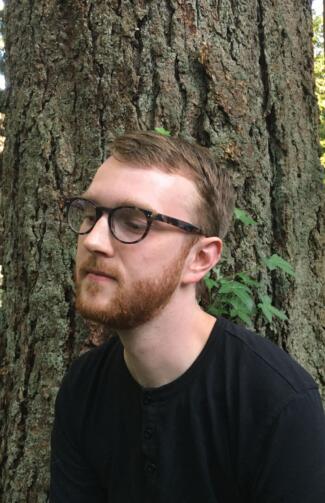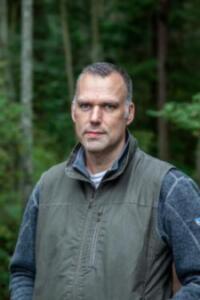1934 Isolation, grief, poetics, birdsong
Wrack Line
by M.W. Jaeggle
Regina: University of Regina Press, 2023
$19.95 /9780889779532
Reviewed by Joe Enns
*
 Wrack Line, M.W. Jaeggle’s debut book of poetry, examines life in consideration of transitions and liminal distances “as crucial as the space / between prayer beads.” Jaeggle uses the wrack line—the area of seashore where organic material and other debris is deposited at high tide—brilliantly as a metaphor for poetry, not only as a palimpsest record of one’s life, the gathered detritus in lines (“…what’s attentiveness / if it’s not a basket with which to gather things?”), but also the grey spaces between the breaking of waves. This motif matches appropriately the sombre tone of Jaeggle’s lines and portrays a yearning for the past.
Wrack Line, M.W. Jaeggle’s debut book of poetry, examines life in consideration of transitions and liminal distances “as crucial as the space / between prayer beads.” Jaeggle uses the wrack line—the area of seashore where organic material and other debris is deposited at high tide—brilliantly as a metaphor for poetry, not only as a palimpsest record of one’s life, the gathered detritus in lines (“…what’s attentiveness / if it’s not a basket with which to gather things?”), but also the grey spaces between the breaking of waves. This motif matches appropriately the sombre tone of Jaeggle’s lines and portrays a yearning for the past.
A great example of this is in the title poem, where Jaeggle writes, “Ask me whether what I have done is enough, / and I will say let there be the loss that a wrack line records.” The trappings between waves measure loss and this evokes a mood of regret and isolation.
Just as the wrack line works as a palimpsest in nature—a partial effacing over a record with each wave—Jaeggle rewrites over his own ancestry, often taken from old photographs. The poem “Sehnsucht” [“Yearning”] describes his great-grandfather as “an unmet face I have inherited,” giving the impression of the face as its own revision of family history. In “Wool Overcoat,” Jaeggle writes, “You can see now, this woman / is your grandmother as she is in a photograph from 1953,” which creates a cloudiness for the reader between dream, memory, and imagination.
Jaeggle draws out this ekphrasis form in Part Four of the book titled “Colville’s Horses.” The part is comprised of seven ekphrastic sonnets derived from paintings by Canadian artist Alex Colville. Some of Colville’s paintings themselves were inspired by poetry, which adds even more complexity to art as a palimpsest. The sonnets are interconnected, as each opening line of a poem comes from the closing line of the poem before. Both the ekphrastic form and the latticed connectedness of the poems echoes the wrack line theme.

Jaeggle, born and raised in Vancouver, explores a duality to examining one’s life, which is personified by “a dowitcher with the head of Janus, one face / revering the wrack line…notice the other half, the face fixed to the sky, / it hears only the bill nicking shells….” Poetry isn’t just a gathering of detritus in one’s life, but a search for clarity in the light (“to the holes within you / where natural light breaks in”), all the while making music. This intersection between self-reflection and light in poetry is best represented in “The House Written the Night Before” where Jaeggle writes, “…the writer, / if he hadn’t been so quick… / might have included external sources of light.”
This tension between gathering and examining the scraps of life yet reflecting with enough distance and light to provide resolution runs throughout Wrack Line. Jaeggle constantly seems to “struggle for clarity / for a sense of what they are / against the falling that obscures them”; and this obscurity is represented by a clouded window blocking perspective. In “Parc-Extension, Late February,” a little girl is “…wiping the foggy window / with her wrist to improve the view,” the wrist possibly a reference to the act of writing. Jaeggle also ties this murkiness to isolation as in “eating alone in the hazy window.” The speaker’s loneliness in the hazy window, but interaction with the girl through the cleared window gives the impression of poetry and self-reflection as a lifting of confusion towards a clarity of self (“that all I am now is what I have seen”). The connection between self-clarity and connection with others is summed up in “Amor de Lonh,” where Jaeggle writes, “a view of myself from outside, / a view that lets you, O loved being, be.” The antithesis to isolation may come through the clarity of self-reflection (with hope) as opposed to sorting through records of regret and loss.
Many of Jaeggle’s poems come across as lamentations or prayers and the lyrical language brings a subtle sense of musicality. Like the dowitcher tapping seashells, Jaeggle references repeatedly patterns of sound and song (“beyond the lighthouse beams, / there’s only the sound of water”). Self-reflection and reconnecting with the past is one thing, but music moves us: “those sensitive to circumstance hold against the blow…then they find an inner pew and sing.” Jaeggle utilizes birds as a recurring contrast between singing and the brutal reality of nature. In the free verse poem “On Boulevard de l’Acadie,” the speaker describes Russian director Tarkovsky’s films as having “compassion towards those that sing,” yet this is stated alongside the image of a falcon who tears out a starling’s syrinx. Similarly, Jaeggle describes the interactions between plants as “not closer to the words petrified by use / but closer to the wind’s dry flowing.” There’s a sort of elevation to singing as art and compassion, but even sound is reduced back to the elements given enough time.
Like a sandy grey shoreline that weaves between waves and sky (“the horizon was a thread / between the sea, a faded porcelain blue, / and the sparse grey clouds that left me”), Jaeggle provides a hazy view of embodied experience, whether real or a dreamt history “…a grey sky fades into salmon scales, / that a bottomless hill is a form fit for thinking.” Wrack Line counters isolation and grief through poetics and birdsong amongst life’s detritus in the grey space between breaking waves.
*
 Joe Enns is a Canadian writer, painter, and fisheries biologist on Vancouver Island. His writing has appeared in The Dalhousie Review, FreeFall, The Fiddlehead, GUSTS, Portal Magazine, and is forthcoming in The Malahat Review. His fiction was shortlisted in FreeFall’s 2020 Prose and Poetry Contest. Joe has a BA in Creative Writing and a BSc in Ecological Restoration. [Editor’s note: Joe has recently reviewed Ali Blythe, Emily Osborne, Will Goede, and Evelyn Lau for BCR.]
Joe Enns is a Canadian writer, painter, and fisheries biologist on Vancouver Island. His writing has appeared in The Dalhousie Review, FreeFall, The Fiddlehead, GUSTS, Portal Magazine, and is forthcoming in The Malahat Review. His fiction was shortlisted in FreeFall’s 2020 Prose and Poetry Contest. Joe has a BA in Creative Writing and a BSc in Ecological Restoration. [Editor’s note: Joe has recently reviewed Ali Blythe, Emily Osborne, Will Goede, and Evelyn Lau for BCR.]
*
The British Columbia Review
Interim Editors, 2023-24: Trevor Marc Hughes (non-fiction), Brett Josef Grubisic (fiction)
Publisher: Richard Mackie
Formerly The Ormsby Review, The British Columbia Review is an on-line book review and journal service for BC writers and readers. The Advisory Board now consists of Jean Barman, Wade Davis, Robin Fisher, Barry Gough, Hugh Johnston, Kathy Mezei, Patricia Roy, Maria Tippett, and Graeme Wynn. Provincial Government Patron (since September 2018): Creative BC. Honorary Patron: Yosef Wosk. Scholarly Patron: SFU Graduate Liberal Studies. The British Columbia Review was founded in 2016 by Richard Mackie and Alan Twigg.
“Only connect.” – E.M. Forster
3 comments on “1934 Isolation, grief, poetics, birdsong”